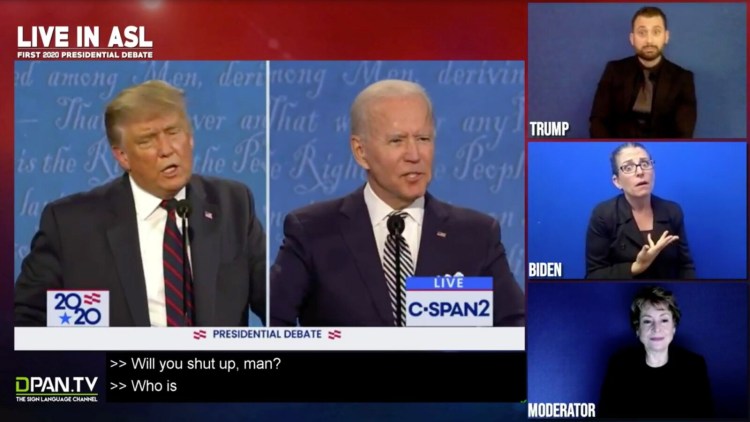A deaf American Sign Language interpreter from Maine is one of the few people getting rave reviews in the wake of the first 2020 presidential debate.
Regan Thibodeau – known in Maine for interpreting televised COVID-19 updates featuring Dr. Nirav Shah, director of the Maine Center for Disease Control and Prevention – was one of three deaf ASL interpreters who translated the debate last Tuesday for DPAN.TV, the Sign Language Channel.
The 41-year-old Windham resident interpreted Democratic nominee Joe Biden, while the two other interpreters were assigned to Republican President Trump and moderator Chris Wallace.
It was the first time a presidential debate or other White House-related event was interpreted by deaf interpreters in a livestream that has racked up more than 330,000 views on Facebook.
“This is history in the making!” Thibodeau said in a written interview over the weekend. “There never has been a (deaf interpreter) for the debates, even for the White House briefings, or for Election Day and the inauguration. I am so excited to help advocate for this to become the norm for standardized access in the media.”
Many Facebook viewers praised the interpreters for being able to keep up with the flood of interruptions, cross-talk and insults exchanged between Trump, Biden and moderator Chris Wallace at Case Western Reserve University in Cleveland.
“Your fingers must be sore trying to keep up with those two,” one viewer wrote on Facebook.

A few memes or gifs have been shared on social media that show Thibodeau interpreting Biden after the former vice president told Trump to shut up or called him a clown.
ASL includes hand signs, body movements and facial expressions. Thibodeau’s interpretation of Biden reflected the antagonistic tenor of the debate, much as her interpretations of Shah have reflected the gravity of the coronavirus pandemic and lighter moments when he has quoted popular song lyrics.
“Shout out to Regan Thibodeau for doing one hell of (an) amazing job interpreting the debate last night!” wrote one Facebook viewer, who also praised Sam Harris for interpreting Trump and Linda Bove for interpreting Wallace.
Married with two children, Thibodeau is a certified deaf interpreter and a part-time ASL faculty member at the University of Southern Maine, where she earned a Ph.D. in educational leadership and public policy in 2019.
Thibodeau learned she would be interpreting Biden just 10 minutes before last Tuesday’s debate. She was standing by as an alternate interpreter in case a scheduled interpreter was unable to do the job. She quickly jumped into action, working via Zoom from her home office.
Thibodeau declined to share many details of her experience during the debate to preserve the neutrality of her role.
“I cannot talk about my personal opinions about my interpreting jobs due to my respect for confidentiality and the fact that the assignment did not belong to me,” Thibodeau said. “It was only because of the (candidates) that I even became a part of it. It is their day, their situation.”
Thibodeau said it’s her hope that she did her best and that deaf people were able to follow the debate because she interpreted effectively.
Thibodeau also is an advocate for and coordinator of Deaf and Hearing Interpreting Teams, which partner a deaf ASL interpreter with a hearing ASL interpreter to ensure optimum communication for people who are deaf.
Thibodeau’s hearing partner behind the scenes last Tuesday night was Miako Villanueva. She interpreted Biden for Thibodeau, who in turn interpreted Biden’s words, expressions and body movements from a deaf person’s perspective.
“Deaf interpreters are the only interpreters that grew up accessing the world as a deaf person,” Thibodeau said. “Then they become trained in the interpreting process. Put those two (skills) together and you have an interpreter that works to provide the best interpretation possible.”
By working in teams, she said, hearing interpreters provide deaf interpreters with nuances of the spoken language and the culture of the hearing speaker, which is why it’s considered a bilingual-bicultural partnership.

Thbodeau interprets Joe Biden as he and President Trump talk over each other during the first presidential debate last Tuesday. DPAN.TV
In the past, members of the deaf community had little access to voting information and relied on hearing friends and family “to tell us who they thought we should vote for,” Thibodeau said.
Closed captioning was a slight improvement but still left deaf people to ask others to make sense of all of it. More recently, several independent organizations provided hearing interpreters via livestreaming.
“Our access to political literacy is growing faster than ever,” Thibodeau said. “This is a joy to see happen in my lifetime.”
Thibodeau said DPAN.TV is expected to livestream deaf interpreters for the vice presidential debate Wednesday night in Salt Lake City and the presidential debates in the weeks ahead, if they occur.
She wouldn’t say whether she will be one of them.
Send questions/comments to the editors.



Comments are no longer available on this story